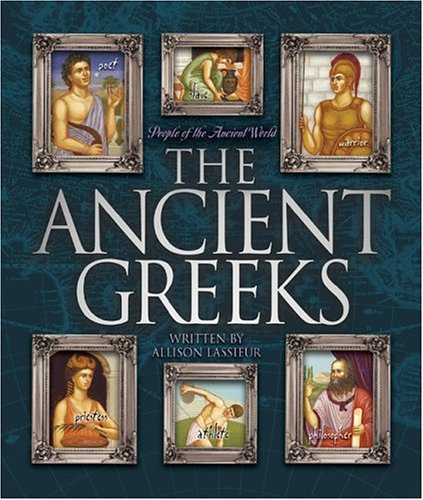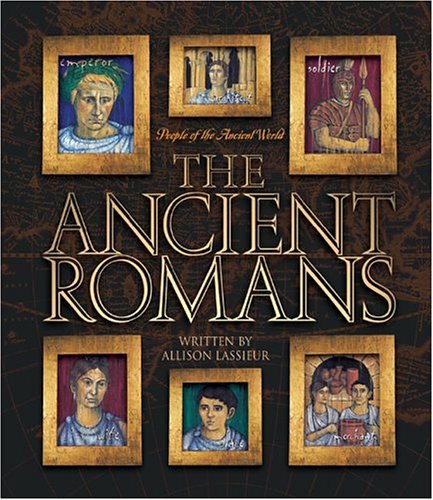People of the Ancient World
2 total works
- The rich, full-color interior has a strong, engaging design that will draw in young readers.
- At 100+ pages, this series offers substantially more information than other books for young readers available in paperback.
- Contains several special features, such as a biographical dictionary, which describes important figures in the civilization, and a timeline.
National Social Studies Standards: Grades 5-8
Culture: I
- Explain and give examples of how language, literature, the arts, architecture, other artifacts, traditions, beliefs, values, and behaviors contribute to the development and transmission of culture.
Time, Continuity, & Change: II
- Identify and use key concepts such as chronology, causality, change, conflict, and complexity to explain, analyze, and show connections among patterns of historical change and continuity.
- Identify and describe selected historical periods and patterns of change within and across cultures.
Individuals, Groups, & Institutions: V
- Demonstrate an understanding of concepts such as role, status, and social class in describing the interactions of individuals and social groups.
Science, Technology, & Society: VIII
- Examine and describe the influence of culture on scientific and technological choices and advancements, such as in transportation, medicine, and warfare.
- At 100+ pages, this series offers substantially more information than other books for young readers available in paperback.
- Contains several special features, such as a biographical dictionary, which describes important figures in the civilization, and a timeline.
National Social Studies Standards: Grades 5-8
Culture: I
- Explain and give examples of how language, literature, the arts, architecture, other artifacts, traditions, beliefs, values, and behaviors contribute to the development and transmission of culture.
Time, Continuity, & Change: II
- Identify and use key concepts such as chronology, causality, change, conflict, and complexity to explain, analyze, and show connections among patterns of historical change and continuity.
- Identify and describe selected historical periods and patterns of change within and across cultures.
Individuals, Groups, & Institutions: V
- Demonstrate an understanding of concepts such as role, status, and social class in describing the interactions of individuals and social groups.
Science, Technology, & Society: VIII
- Examine and describe the influence of culture on scientific and technological choices and advancements, such as in transportation, medicine, and warfare.
- The rich, full-color interior has a strong, engaging design that will draw in young readers.
- At 100+ pages, this series offers substantially more information than other books for young readers available in paperback.
- Contains several special features, such as a biographical dictionary, which describes important figures in the civilization, and a timeline.
National Social Studies Standards: Grades 5-8
Culture: I
- Explain and give examples of how language, literature, the arts, architecture, other artifacts, traditions, beliefs, values, and behaviors contribute to the development and transmission of culture.
Time, Continuity, & Change: II
- Identify and use key concepts such as chronology, causality, change, conflict, and complexity to explain, analyze, and show connections among patterns of historical change and continuity.
- Identify and describe selected historical periods and patterns of change within and across cultures.
Individuals, Groups, & Institutions: V
- Demonstrate an understanding of concepts such as role, status, and social class in describing the interactions of individuals and social groups.
Science, Technology, & Society: VIII
- Examine and describe the influence of culture on scientific and technological choices and advancements, such as in transportation, medicine, and warfare.
- At 100+ pages, this series offers substantially more information than other books for young readers available in paperback.
- Contains several special features, such as a biographical dictionary, which describes important figures in the civilization, and a timeline.
National Social Studies Standards: Grades 5-8
Culture: I
- Explain and give examples of how language, literature, the arts, architecture, other artifacts, traditions, beliefs, values, and behaviors contribute to the development and transmission of culture.
Time, Continuity, & Change: II
- Identify and use key concepts such as chronology, causality, change, conflict, and complexity to explain, analyze, and show connections among patterns of historical change and continuity.
- Identify and describe selected historical periods and patterns of change within and across cultures.
Individuals, Groups, & Institutions: V
- Demonstrate an understanding of concepts such as role, status, and social class in describing the interactions of individuals and social groups.
Science, Technology, & Society: VIII
- Examine and describe the influence of culture on scientific and technological choices and advancements, such as in transportation, medicine, and warfare.

